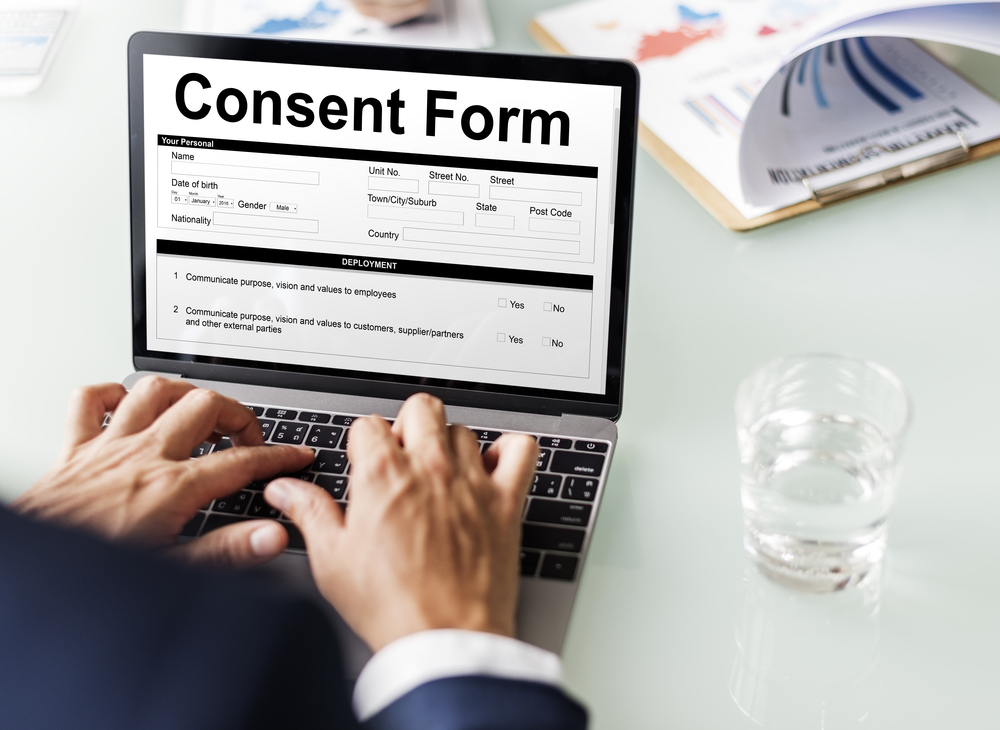What Is Electronic Consent? Importance and How It Works

Technology is almost a part of every touchpoint in one’s life, from checking social media notifications when they wake up to going through their email inbox at work. With how much people are online, that’s potentially as much private information they’re sharing with various platforms.
Customers must take control of their personal data by learning how to give online or digital consent. As emerging technologies continue to reshape digital experiences, users must understand electronic consent, set boundaries for privacy, and navigate online transactions wisely.
Digital transactions often involve online consent forms requiring personal information. So, users mustn’t mindlessly click the “Agree” boxes but understand the implications and ensure data protection. It’s your responsibility as the business or online platform to ensure that your audience knows what they’re signing up for and what you’ll do with their data.
Fortunately, the Philippines highly values consent and privacy as basic rights, with the Supreme Court affirming privacy as constitutionally protected. With the law outlining the terms of electronic consent, explore its importance and how it works in protecting data privacy and cultivating customer relationships in this guide.
What is Electronic Consent?

Electronic consent is the act of digitally granting permission or approval for the collection and processing of personal data. It ensures that users have control over their data and understand how another party will utilize it.
Furthermore, electronic consent is the foundation of data privacy regulations. These legislations provide a framework for transparent and ethical data-handling practices in an increasingly digitized world.
In the Philippine context, electronic consent holds significant importance, especially in compliance with Section 3(b) of the Data Privacy Act. This section states that consent must be freely given, specific, and informed, indicating the data subject’s willingness to have their personal information collected and processed.
There are various forms of electronic consent. The following serves as evidence of consent in the digital platform:
- Clicking “I agree” or “Accept” buttons on websites or mobile applications before accessing content or services.
- Checking boxes to opt-in for newsletters, promotional emails, or marketing communications during online sign-up processes.
- Digitally signing contracts or agreements.
- Selecting preferences in cookie banners regarding the use of cookies and tracking technologies on websites.
- Choosing privacy settings and preferences on social media platforms or online accounts.
- Responding to consent requests through SMS or other messaging platforms.
How Electronic Consent Works
Electronic consent is pivotal between businesses and online users because it’s the basis for ethical data-handling practices. Online users must be assured that their data is handled sensitively, while companies must ensure that they only use the information they receive as indicated on their consent forms.
Obtaining electronic consent doesn’t always have to be from one person to another; you can employ various technologies, such as AI-powered chatbots and customer data services, to engage with users and gain their consent seamlessly.
To better implement electronic consent, here are its critical aspects:
-
User interface and interaction
Businesses often utilize user-friendly interfaces to facilitate the consent process. It involves clear and concise language that details the purpose, extent of data collection, and specific services or features users consent to. For instance, when users sign up for a social media platform, they are presented with straightforward checkboxes or options regarding data sharing preferences.
-
Transparency and information
You must honor transparency and provide users with comprehensive information about how their data will be used, including any third parties with access to it. For example, a healthcare app must disclose how user medical information will be stored, accessed, and shared with healthcare providers.
-
Consent management systems
To streamline the consent process and ensure compliance with data privacy regulations, companies often employ consent management systems (CMS). These solutions provide a consolidated platform for tracking and documenting consent while enabling individuals to easily modify their settings.
For instance, with just a few clicks, a CMS may allow users to update their marketing communication preferences or revoke consent for certain data processing activities. Convenient and reliable user acquisition solutions can assist organizations in attracting more customers, making electronic consent more achievable.
What is the Importance of Electronic Consent?
By getting informed consent from users, businesses can uphold data privacy rights and build stronger relationships with their customers. Below is a list of why electronic consent is crucial in the digital landscape:
-
Privacy protection
Electronic consent enhances privacy protection by empowering individuals to control the collection and use of their data. Without valid electronic consent, users’ privacy rights are at risk of violation. For example, in 2018, Facebook faced scrutiny over its handling of user data and was fined for failing to get proper consent for data sharing with third-party apps.
-
Legal compliance
Consent is the legal foundation for lawful processing under data privacy laws and cybersecurity regulations in the Philippines. As per the Data Privacy Act of 2012 (Republic Act No. 10173), organizations must obtain consent from users before they collect or process their personal information.
A violation of this Act, whether unauthorized processing or malicious disclosure of personal data, will entitle you to imprisonment and hefty fines.
-
Personalized experiences
Information from online consent forms allows you to deliver customized experiences tailored to the user’s individual preferences and behaviors. By using a customer insights tool through consented data, you can offer targeted content and promotions that resonate with your audience.
If you have an e-commerce platform, you can look at the customers’ past purchases and browsing history to personalize product recommendations, enhancing their shopping experience.
-
Trust and transparency
Electronic consent fosters trust and transparency between businesses and consumers. Clear information about data practices enables users to make informed decisions.
For instance, online banking platforms deal with tons of sensitive customer information, and any data mishaps can result in theft. Users will tend to trust applications that promote transparency in consent processes. When they know that a business values their data, they will likely trust it with their finances and information, thereby increasing adoption and usage.
-
Ethical data handling
By collecting and processing personal data transparently and responsibly through electronic consent, you abide by ethical data-handling practices. Implementing electric consent shows that you respect individual privacy rights, as it involves asking for users’ explicit consent.
Promote Data Protection through Electronic Consent
Digital consent anchors privacy protection, legal compliance, and trust-building. It’s also vital for making personalized experiences and adhering to ethical data-handling practices.
By prioritizing electronic consent, you can cultivate more robust client relationships. Remember that to grow as a business, you must value transparency, accountability, and user empowerment.
Strengthen your customer connections even further with Inquiro. If you want a targeted approach for your audience and to make informed decisions while adhering to laws and regulations, turn to Inquiro. Contact us or request a demo with Inquiro today.



